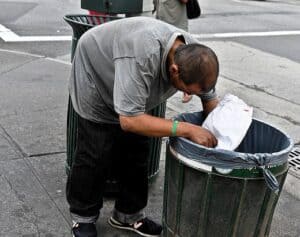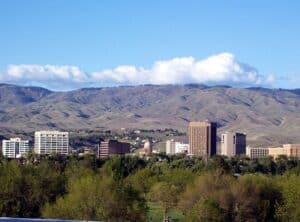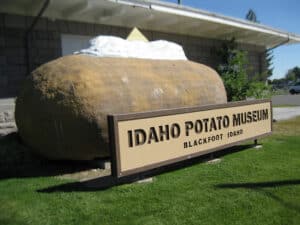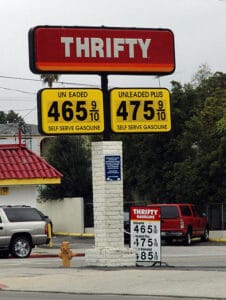Wandering the streets of Boise, I came across a homeless guy picking through the trash. I was just finishing my lunch, a McDonalds #1 value meal, which, if you don’t already know, is a Big Mac, soft drink and fries. Foolishly, I had agreed to super size it, which meant that now I had far more fries than I had could reasonably consume, so I offered them to the homeless guy.
He fell back as if he’d been punched.“Never!” he cried. “Take them away! Take them out of my sight!”
Perplexed, I tossed the fries in the trash and began to walk away.
“Wait!” he cried. “Forgive me. I didn’t mean to startle you. That was very kind of you to offer me your fries. It’s just that – well, I have a visceral reaction to them.”
Normally, I would walk away at this point, but there was something rational and sincere in his manner, and he seemed peculiarly articulate for a homeless man, so I asked him why – why did he have a visceral reaction to french fries?
“Oh, you wouldn’t believe it,” he said. “Sometimes I can’t believe it myself. So much money, such a great opportunity. Gone, all gone.” He shook his head in dismay and sat down heavily on the curb. He gestured for me to sit down beside him.
I did, surrendering to my curiosity. We sat there, watching the traffic go by. Then he told me his story. It was incredible.
Chasing the Dream
“I wasn’t always like this. Once upon a time, I was well-to-do,” he said. “I had dreams. What’s more, I had the resources and education to parlay them into something bigger. America, the land of opportunity. That’s what I had in mind.
My father was an entrepreneur. My grandfather had been an entrepreneur before him, and I planned to be rich and successful like them.
“I was willing to work hard, and I had an advantage. I lived in Boise. French Fry World was going to be the name of my chain. The stores were going to offer nothing but french fries – crinkle cut, cottage style, curly, English chips, etc. – with a choice of sauces: catsup, mayonnaise, vinegar. Any combination for $6.99.
“It promised to be a huge success. The V.C.’s loved it. They were falling all over themselves trying to give me funding. We projected to open 500 stores domestically in the first year, another 500 the next. The upside was limitless. But I had a problem.

Unfortunately, this little fellow and his love for toys triggered a string of events that led to disaster.
“I needed potatoes. Lots of potatoes. And I needed to know what those potatoes were going to cost, not just now but six months from now, when we started rolling out the franchises. So I put out a future’s contract.
“If you don’t already know, a futures contract is an agreement between two parties to exchange an asset for an agreed upon price today with delivery occurring at a future date. In my case, I agreed to buy a 100,000 kilograms of potatoes at $800,000 for delivery in six months. If potato prices spiked between now and then, I was insulated. I would still get my potatoes for $800,000. But if prices fell, I would have to take delivery of the potatoes at a higher price than the market called for. I would be overpaying for my potatoes. That was a risk I was willing to take.
“The other party was speculating that the price of potatoes would fall. If prices for potatoes actually did fall to $700,000, I would still pay him $800,000 and he would pocket the $100,000 difference.
But that’s not what happened.
Lumpy China Dolls
“Chinese consumerism was on the rise, a net good for the United States, as I had been taught to believe – I certainly looked forward to the day when the first French Fry World opened in Beijing! But what I didn’t understand until too late was that only one group of Americans was destined to benefit from China’s spectacular growth. What happened was this.
“Chinese children, who had never experienced classic Western toys like Etch-a-Sketch and Slinky, discovered Mr. Potato Head. The demand for potatoes into which children could stick googly-eyes, red plastic lips and a jaunty top hat sky rocketed. The price of potatoes soared. At first I was laughing. This was great! The price of potatoes had risen to $1 million dollars, and I had contracted mine for a mere $800,000. But then reality set in.

What he didn’t factor in were the speculators, mere gamblers, get-rich-quick artists who had gamed the system to their advantage.
“The demand for potatoes continued to rise as the Mr. Potato head craze swept East Asia. The next time I went to make a contract, the price would be higher. But I could still stay ahead of the curve if I acted fast. Or so I thought.
“What I didn’t factor in were the speculators, not legitimate business people like myself who had a reason to hedge potatoes, but mere gamblers, get-rich-quick artists who wanted to see the price rise in order to make a quick buck.
“What I didn’t see coming was the number and intensity of these speculators. I suppose it might have been fair – even desirable – if these people had acted within the constraints of a free market, but they didn’t. They had gamed the system so they could buy and sell potatoes without ever having to take delivery, which meant they never had to incur the costs or logistical challenges of legitimate speculators and could afford to simply run up the price.
“What’s more – and here’s what really shocked me – these speculators could buy more potato futures than there were physical potatoes in the marketplace! Naturally, if the number of people speculating that the price of potatoes would rise was greater than the potatoes available to buy, this would be perceived as a seriously underpriced commodity, which would lead to another round of frenzied speculating, driving up the price even higher.
“The cost of my potatoes was going through the roof! My $6.99 consumer price had already inflated to $7.99. If it went much further my whole business plan would be at risk. Then disaster struck.
Grow, Baby, Grow!
“About that time the Western-friendly government of a little known Central Asian backwater was overthrown by a belligerent anti-capitalist regime. The West retaliated with sanctions. Unfortunately, that backwater was one of the world’s top producers of spuds. The sanctions drove potato prices even higher. My whole enterprise was on the verge of collapse. So I wrote to my congressman, who had a brilliant solution. We needed to stop buying spuds from foreign sources and expand our domestic supply.
“The problem was those damned liberals. They were preventing us from converting large tracts of public land into working potato farms. More than 52% of land in Idaho is public land, most of which is used for wildlife conservation and recreation. Large swaths of it could be converted into corporate potato farms if the liberals would just shut up and get out of the way.
“So I sent money to my congressman and enlisted in causes designed to overcome liberal objections to corporate farming on public lands. It worked. The amount of acreage devoted to corporate farming grew by 20%. Unfortunately, the price of potatoes continued to rise – and for a very good reason.

There were plenty of potatoes, warehouses full of them, but then the corporate potato farmers deliberately strangled the supply.
“Among the speculators making a killing on the rising cost of potatoes were the corporate potato farmers themselves! By getting access to public lands they had won the ability to grow potatoes whenever and wherever they liked, regardless of the environmental impact. But that didn’t mean they had to actually pick the potatoes.
“With the cost of potatoes going through the roof, American consumers had started cutting back on their potato consumption. So the corporate farmers cut back on their harvest, claiming that domestic consumption was going down. Consequently, millions of potatoes were left to rot in the fields!
Grotesque
“Even so, global demand was still high – the Mr. Potato head craze in East Asia had still not let up – so by suppressing supply the farmers and speculators were keeping prices up, allowing them to reap huge profits when they went to sell.
“I was sick. I went to my congressman and voiced my objections. He told me not to fret, that this was good for America. He told me we were rewarding the job producers. I told him I was a job producer, that my chain of restaurants would have employed 30,000 people within five years, if I could only have gotten my potatoes at a reasonable price, but he only laughed. “What’s good for Wall Street is good for America. Everybody knows that.”
“My enterprise collapsed. I lost everything. The Wall Street speculators got rich. They insulated themselves on the back end by selling short and raking in huge profits in arbitrage. If you don’t know what arbitrage is, you should look it up.
“The problem with speculators is that they don’t produce anything of value, except for the profits they generate for themselves. When speculators start hindering job producers, something has to be done, or you are flirting with disaster.
“Take a look at a potato field. When the potatoes rot they grow grotesque tumors as they slowly collapse in on themselves.
When I look at a potato now, I can’t help but think of our economic system. The tumors are flourishing while the thing that gives them life slowly rots away.
The Ravings of a Lunatic
He got up slowly from the curb and thanked me for taking the time to listen to him. He said he would have told his story to a therapist, if he could afford one.
I offered to run back down to the McDonalds and get him something to eat, something other than french fries, but he wouldn’t hear of it. It was enough, he said, to have taken up my time. He wished me well and left me to reflect on what he’d told me.
It had to be wrong, the ravings of a lunatic. Our government would never allow speculators to buy a commodity and never take delivery of it. That was ludicrous. And the notion that speculators could buy more futures contracts than actual physical commodities in the marketplace, well, that was just absurd. And the idea that producers of a commodity could suppress supply in order to drive up the price. Unimaginable. I couldn’t imagine where he got such crazy notions. This was America. We had the greatest economic system in the world. No way it was open to such corrupt shenanigans.
Still, it seemed plausible somehow.
As I drove out of Boise, I stopped for gas.
For some reason, I couldn’t get it out of my head.
Previous stop on the odyssey: Seattle, WA //
Next stop on the odyssey: Hamilton, MT
| About the author: Malcolm Logan is a freelance writer who specializes in US travel and US history, designing driving tours, seeking out interesting destinations and exploring US adventure travel. He can be reached at myamericanodyssey1@gmail.com |
| Image Credits: Homeless guy, Jazzguy; Boise, Idaho, Tim Newman; French Fries, Brett Jordan; Chinese child, epSos.de; Mr. Potato Head and friends, Ian Mutto; Gambling, Adrian Sampson; Buy, Gunnar Pippel; War with North Scooziland, Bitanin; Millions of potatoes, Wouter Hagens; Giant potato, Rayb777; Grotesque potato, Dlancea |










2 comments
[…] Previous stop on the odyssey: Silicon Valley, CA // Next stop on the odyssey: Boise, ID […]
[…] stop on the odyssey: Boise, ID // Next stop on the odyssey: Hamilton, […]